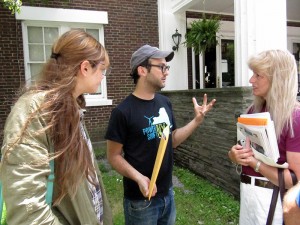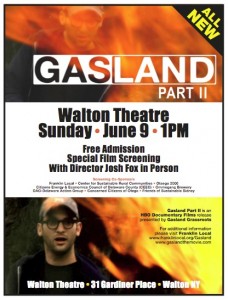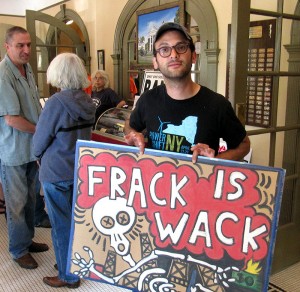By Eugene Marner
An Interview with Director Josh Fox
Sunday, June 9th, was the first clear, warm day after nearly a week of cold and rain. Even so, over two hundred and fifty people came to the Walton Theatre that afternoon to see Gasland Part II, a two hour film, then stayed for another hour to discuss it with the director, Josh Fox.

It was almost three years to the day since Josh brought his first film, Gasland, to Walton in 2010. That film told the stories of ordinary people whose lives were suddenly subjected to an invasive and ruinous process called fracking for gas. Gasland went on to win international acclaim and to be nominated for an Academy Award for Best Documentary.
I had a chance to speak with Josh, and asked why he felt the need for a sequel.
“Well, honestly,” he replied, “I was completely shocked by the success of the first film. It went all over the world, it went to thirty countries. We saw a movement grow around this fracking issue, nationally and internationally. And I couldn’t understand why the government wasn’t really paying attention. We saw an incredible reaction to this crisis from the people: multinational corporations were coming in to despoil the atmosphere, toxify the landscape, jeopardize the people’s health and then leave with their profits. It’s a classic old story. This is what energy extraction companies do. So why wasn’t our government stepping in to protect Americans? Why in the 21st century, with this huge amount of media attention on the issue, was there no action anywhere but, basically, New York? And Obama was going in the opposite direction, quoting oil and gas industry talking points in his 2012 State of the Union address, which is in the film. What was going on? That’s what I wanted to look at this time. So this is an investigation into another level of contamination due to fracking––the contamination of democracy. And what we found was equally shocking to the water being lit on fire in the first movie. This is our democracy being lit on fire.”

The first Gasland film came out as the Deepwater Horizon disaster in the Gulf of Mexico unfolded. At the time, Josh was struck by the response of the government to that crisis, together with the inability of the media to gain access.
“It was apparent that BP was running the government response down in the Gulf of Mexico. If this is the case with the largest environmental disaster in the history of the United States, what is it going to be like with fracking? That set us off.”
Fox brought Gasland Part II to Walton as part of a national grass-roots tour before the film premieres on HBO on July 8th.
Why tour now?
“We wanted to give the film directly to the people who created it with us. I toured with the first Gasland to two hundred and fifty cities across America. It took a year and a half. It was absolutely insane. It was a full-time job, meeting with people, talking to people in communities and showing the film and having a discussion. And, to me, that was another layer. Movies don’t change the world. Movies raise awareness. But when you really want to change something, you have to show up and you have to be there. I don’t think I’ll do two hundred fifty cities again. Too exhausting. I’ll do as many as I can. But, before the film goes on HBO, I wanted to give the film to the people to whom it matters the most, the people who are fighting these battles locally.”
Gasland Part II is powerful and moving. From the horrifying aerial shots of the oil-streaked Gulf of Mexico, to the wrenching stories of the people struggling on the front lines of fracking, to the shock of Josh being handcuffed and arrested in our Capitol for trying to video a congressional hearing, we begin to see that we are on our own.
“It’s hard,” he told me, “to watch your government literally being taken away from you by the oil and gas industry, and that’s what we saw as we tracked these different EPA investigations, DEP investigations, in Wyoming, Texas, Pennsylvania. We follow the New York situation. We follow the frackers as they expand world-wide. We look at climate change––fracked gas is the worst fuel you can use with respect to climate change because methane together with carbon dioxide is worse than coal.

“What we’re trying to say is, look, when your democracy isn’t functioning correctly…you have to invent new forms of democracy. And those new forms of democracy are this movement. Last night I was with Pete Seeger in Waltham, Pennsylvania, and I had to introduce him…I said, ‘This is a man who is not just a songwriter. He’s one of the authors of America.’ Then I said to the people in the crowd, in the fracking movement, ‘you have to think of yourselves as authoring America, as authoring the next stage of our country.’
“I was playing the Star Spangled Banner on the banjo which I do at the end of the movie as the credit music, and Pete told me that it was the biggest hit of 1814 and it was a bar song and this guy sang it in a bar and they loved it so much that he had to sing it twice and, at four miles an hour, clip-clopping up and down the East Coast, they spread the lyrics around and it became the National Anthem.
“This is amazing: if a bar song can become the National Anthem, it says that America is something you’re making up as you go along and that’s what I’m witnessing when I’m watching people fight off the gas industry, these multinational corporations.
“They pose as American, but they’re not. They’re BP, they’re Royal Dutch Shell. Exxon Mobil has no country.”
